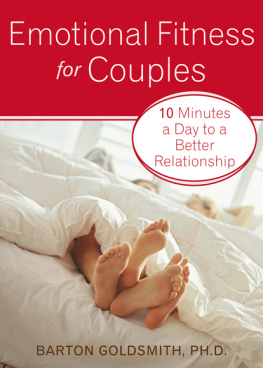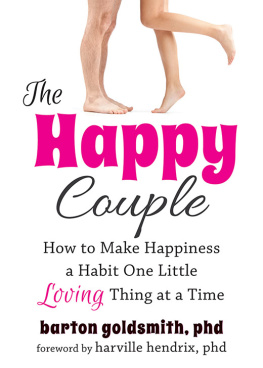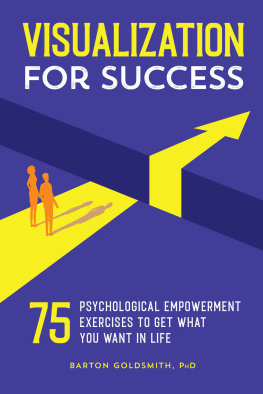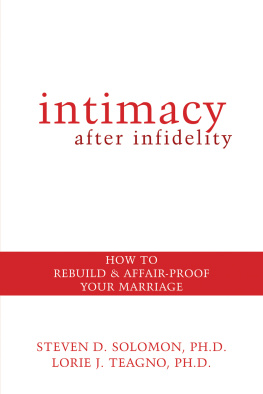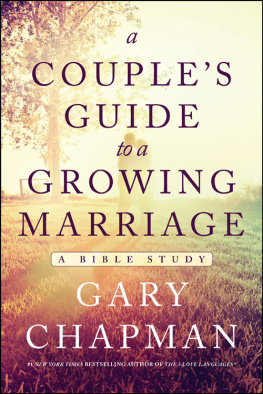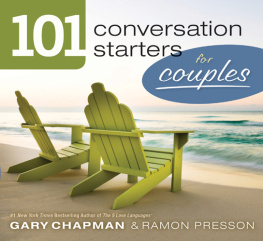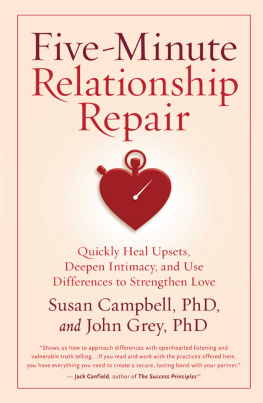Acknowledgments
At New Harbinger Publications, Id like to thank publisher Matt McKay, acquisitions editor Melissa Kirk, and publicity maven Earlita Chenault. I would also like to thank my copyeditor, Brady Kahn.
This book wouldnt exist if not for the readers and editors of my column, and I will be forever grateful to the Ventura County Star and Scripps Howard News Service for their unwavering support, as well as to the editors of the two hundredplus papers who have graciously run my articles.
The team (and my dear friends) at KCLU/NPR have been nothing but supportive, innovative, and just plain fun to be around. They include Mary Olson, Jim Rondeau, Lance Orozco, Mia Karnatz-Shifflett, and Jocelyne Rohrback. Thank you also to the many guests who have shared their wisdom with our listening audience.
My team at the office, Mary Trudeau and Wendy Cherry, make my life workand I also get to enjoy their company.
I am honored to have learned from my colleagues, including Stephen Trudeau, Harville Hendrix, Bernie Siegel, Scott James, Michael Agress, William Glasser, Judith Orloff, Gary Chapman, Linda Metzger, Jeffery Zeig, Linda Loomis, James Hollis, Susan Shapiro Barash, Linda Gerrits, and Louise L. Hay. Some of my mentors have passed on; I acknowledge with gratitude the late Albert Ellis, David Viscott, and Elizabeth Kubler-Ross.
To my loving family and lifelong friends Michael Park; Kevin Connelly; Shelley MacEwen; Nancy, David, and Nina Padberg; Brenda and John James; Kevin Hanley; Rebecca Love; David and Dan Richmond; Jeb Adams; Jason Love; Trygve Duryea; Robert Scully; Leigh Leshner; and the dearly departed Indus Arthur: thank you for sharing your time with me.
I am deeply humbled to have received several professional awards and wish to thank the American Association of Marriage and Family Therapists for the Peter Markin Award for Humanitarian Acts, the California Association of Alcoholism and Drug Abuse Counselors for the Joseph Giannantoino Award for the Outstanding Educator of the Year, and the California Association of Marriage and Family Therapists for the Clark Vincent Award for Writing.
And finally, I thank Silva, who has my heart and teaches me the true meaning of intimacy.
Barton Goldsmith, Ph.D., has more than twenty years of experience as a therapist and has been named one of the countrys top relationship experts by Cosmopolitan magazine. His weekly newspaper column, Emotional Fitness, appears in more than two hundred newspapers. He also hosts a weekly radio show on KCLU/NPR, broadcast in the Los Angeles, Ventura, and Santa Barbara areas. Goldsmith is author of Emotional Fitness for Couples and has appeared on CNN, Good Morning America, Fox & Friends, CBS News, NBC News, Beauty and the Geek, and The Greg Behrendt Show. He regularly offers workshops to the public. More information is available online at http://www.bartongoldsmith.com.
Chapter 1
True Love vs. In Love
I have had many people sit on the therapy couch, look deeply at their partner, and say, I love you, but Im not in love with you. As the eyes of their other half fill with tears, I explain to both of them that this is not a bad thing. Now they can get down to the business of having a real relationship and loving each other as two people should.
Hey, you know Im all about intimacy, and being in love is a great rush. The problem is that the hangover from this kind of infatuation can kill you. Many people are not rational when theyre in love, and some have a tendency to suffer deep depression if the relationship ends.
Everyone wants to be in love, and why? Because it feels soooo good. Being in love creates activity in the brain that sends little electrical impulses throughout our bodies, making us feel all atwitter. The problem is that for most couples being in love almost never lasts forever. Yes, a few wedded pairs are able to stay connected in that way, but its not the norm.
The feelings we have while we are in love make us feel immortal, brilliant, powerful, and just plain wonderful. Unfortunately, being in love also creates a kind of emotional blindness.
While we are in love, we dont contemplate if a partner will be willing or able to take care of us when we are sick, if he or she is ready to become a parent, or how were going to pay for the mortgage on that dream house.
True love is a combination of emotions and actions, including talking, tenderness, and trust. These behaviors are an ample replacement for the heart-pounding, sexual excitement of being in love. Your drive changes from needing to be with the other person to wanting to care for him or her, and you can still have a hot and heavy romantic relationship in the process.
Making the shift from not feeling in love to treasuring the feelings of true love may seem a little awkward at first, but with some time and effort, the rewards are priceless. Nothing can take the place of two hearts becoming one for a lifetime.
Here are a couple of tips for easing the transition from being in love to feeling true love.
- If you are married or had a commitment ceremony, suggest to your partner that you invite all your friends over for a party without telling them that you are reaffirming your wedding vows. This surprise ceremony will make everyone feel the love you have for each other. Not only will you feel the love returned from your partner, but having it witnessed by the people who care for you will create a powerful and enduring memory. Yes, this will take more than ten minutes, but the joy will last forever.
- Theres truth to the saying that you dont know what youve got until its gone. This exercise is not for the faint of heart. Its profound and a bit dark: the next time you are away from your love, imagine that you are all alone. She or he isnt there anymore. What would your life look like? Feel the loss, and cry the tears. Youll wake up the next day feeling more inspired than ever to do what it takes to deepen and strengthen your relationship.
Chapter 10
Consider This
If you want to preserve your intimacy and deepen it, its best to speak your thoughts and feelings to your partner. Yet sometimes this is hard, especially if youre asking your partner to look at the other side of an argument or to do something differently. How many spouses choose to be silent for years rather than ask their partner to take on more responsibility in household chores? I dont know the percentage, but it must be high.
How do you ask your mate to set the table or miss a game or return to cooking after a decade-long hiatus?
Rather than engaging in valuable communication, some people deal with their negative feelings by giving others the silent treatment. But clamming up, quietly fuming, or staring down another person is about as productive as trying to put out a fire with gasoline.
If youre hurt or angry, holding it in is unhealthy for you and your partner. To overcome this stress-inducing behavior, start by asking yourself what you hope to gain by continuing to be silent. Common sense dictates that if you have a goal or a game plan, communicating will help you get there.
Funny thing is, most problems are easily solved if you just kindly and honestly discuss whats on your mind. The key lies in the delivery. Remember that wise old saying, Its not what you say but how you say it? Speaking with a soft voice and choosing words that are not inflammatory will help. But other steps are sometimes necessary, especially if you want someone to go above and beyond what he or she might consider the call of duty.
People will usually only do what they want to do or have to do unless you make it worth their while.
Heres a revolutionary suggestion: simply ask your loved one to Please consider [insert your request here], and let me know how you feel about it when youre comfortable. Be very clear that you dont want an answer right away. Thinking about it and even discussing it can also be important steps.


